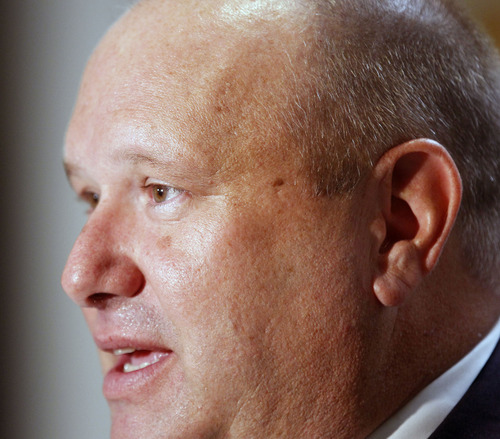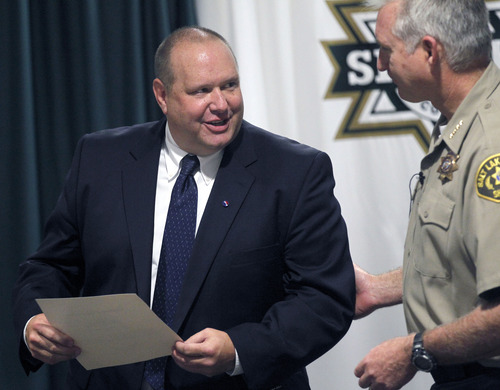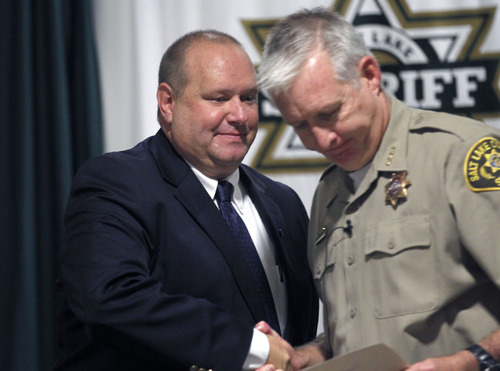This is an archived article that was published on sltrib.com in 2014, and information in the article may be outdated. It is provided only for personal research purposes and may not be reprinted.
When it comes to homicides, Todd Park has never liked the word closure.
That's coming from the award-winning Unified Police detective who has solved at least a dozen cold cases in his two-decade career in homicide, about half of which he spent working cold cases full time. From where he sees it, the families "are never going to get closure for what happened to their loved one. They can't shut the door on that."
But he has given them answers.
After a stint as the state's only full-time cold case investigator, as far as he knows, Park has to close the door on unraveling old mysteries. The 30-year officer started working last week as a patrol sergeant. Another detective, whom the Salt Lake County sheriff described as their most seasoned officer in homicide, is taking Park's place and bringing fresh perspective.
Park is excited about the switch — which is a promotion — but sad to be leaving a calling that has marked his career and, possibly, made a difference in many people's lives.
—
Cracking into cold cases • When Park arrived in the homicide unit in 1998, the first death that landed on his desk was a cold case. He cracked it, and asked for another. So they gave him the holiday murder of a teenage boy.
It was 1993, and Sylvia Mosier wanted to buy her 14-year-old son, Christopher, a musical instrument for Christmas. The Taylorsville single mother couldn't afford the present on a Tres Hombres hostess' wages, so she started babysitting a child at her home, Park said.
"Part of the arrangement was, sometimes during the holidays, Sylvia would get called in early to be a hostess, and she set it up that Christopher could watch the baby for the last hour," Park said. But on Dec. 30, the baby's father, Terry Johnson, showed up at the Mosiers' apartment and stabbed Christopher 21 times, Park said. Years passed, and Johnson was never charged.
"Every year, Sylvia would call the sergeant who was in the homicide unit at the time, saying, 'Another year's gone, my son's still dead, and we still don't know who the killer was,' " Park said.
In the meantime, the baby's mother "was so afraid of [Johnson] that she would put clothes underneath the bed in a suitcase and as soon as she could get enough money, she took her and the baby and high-tailed it out. Never told [Johnson] where she was at," Park said, "but I found her."
In 2002 — with the help of improved DNA testing — prosecutors brought charges. A jury convicted Johnson in 2004.
"When I solved that, that sergeant [who had been answering Mosier's calls] — this great, big, tough guy — I saw him break down and cry over that," Park recalled.
Unified Police, which covers much of Salt Lake County, had accumulated numerous unsolved murders. It was during the Mosier case that Park's supervisor approached him about working cold cases full time; but first he had to prove the position was worth the expense.
"They're only going to give us six months, so you've got to produce," Park recalls his supervisor telling him. They pulled it off by solving another case, and in 2005, Park got the job.
—
A successful career • Park was never interested in busting down doors. He's slower-paced, meticulous. When Salt Lake County Sheriff Jim Winder came over to Park's home one day to borrow lawn equipment, he looked around the garage and saw that everything was in order and in its place.
"His comment back to me was, 'It's no wonder why you do what you do,' " Park recalled. "I am anal retentive, that's for sure."
It's that organized and patient way about him that made Park a great cold case detective, Winder said. The job is not for officers who can't play the long game.
"You're planting a seed, and then you go back. Not everybody can do that," Winder said. "Then if you take it to the next step on cold cases, think about that, you're moving a chess piece, you might not see fruition for a year, two years, five years."
Park has been instrumental in solving several high-profile cold cases, including the arrest of Gerald Walter Hicker for the shooting death of 21-year-old BYU student Barbara Jean Rocky in March 1974, and the arrest of Thomas Noffsinger in connection with the rape and death of 17-year-old Felicia Pappas in April 1989.
Taking notice of Park's growing expertise, police agencies from around the country have called him seeking insight.
Here in Utah, when Wasatch County deputies wanted help on the puzzling 1995 death of Krystal Beslanowitch, they called Park, among others, and were ultimately able to solve it.
In 2012, the Vidocq Society awarded Park their medal of honor for his success. The society is a nonprofit organization comprising forensic professionals and private citizens who meet to discuss and investigate unsolved homicides.
Throughout it all, the families of victims in cases Park has solved have stayed in touch. It surprises him, since he's connected to a dark corner of their lives, but it tells him he made a difference in their lives.
"Really, the end result is we want to solve these cases for these families," Park said.
Now Park is taking his patience and knowledge to a supervisory position, where he'll be a mentor to younger officers.
It's a department philosophy to promote people back into patrol, which Winder called UPD's "most important function."
"Some people take it as a negative," Winder said. "It certainly is not … We're proud of his service; we're proud that he'll go in and work in that function."
—
Moving on • Park tries to bring families answers, even if that is limited to who and how. The why, most of the time, remains out of reach; as do the resolutions of some cases.
"I can think of two cases right now that just gnaw at me," Park said, though he declined to say which ones.
Besides, those cases are Detective Ben Pender's now.
As a younger policeman, Pender never wanted to investigate homicides. He spent most of his career working traffic cases, then he joined a Drug Enforcement Administration task force.
But one day in 2005, his supervisor came to him and asked a favor: spend six months in homicide while Park takes a shot at doing cold cases full-time.
A disinterested Pender said yes, since the supervisor was a friend. But, much to his surprise, he fell in love with it.
"It was probably just … really, seeking justice and trying to solve something for families," said Pender, who has been in law enforcement almost 25 years. He gives out his work cell number and welcomes calls at 2 a.m. He doesn't want the victims' loved ones to have to wait. He wants to help them during "probably the worst thing you could ever imagine anybody going through."
He shaved his undercover guise of long hair and a beard, kept the clean-shaven look and never went back to the DEA.
And Park is just a phone call away. He and Pender will continue to talk about the cases, Park said.
The department still doesn't know who killed Nikole Bakoles, better known for years as "Saltair Sally," and left her body in the mud east of the eponymous concert venue near the Great Salt Lake. And the remains of Nancy Wilcox, Ted Bundy's first suspected Utah victim, have never been found.
Those are just two of the 62 cases, dating back to the 1960s, that are listed on UPD's website of missing persons and unsolved murders.
Pender's ready to get started.
Twitter: @mikeypanda







